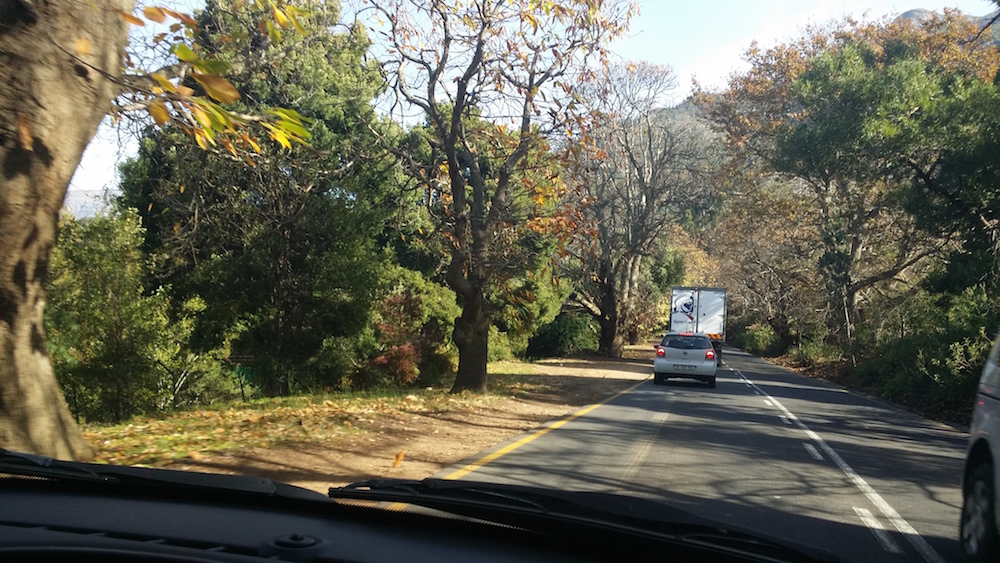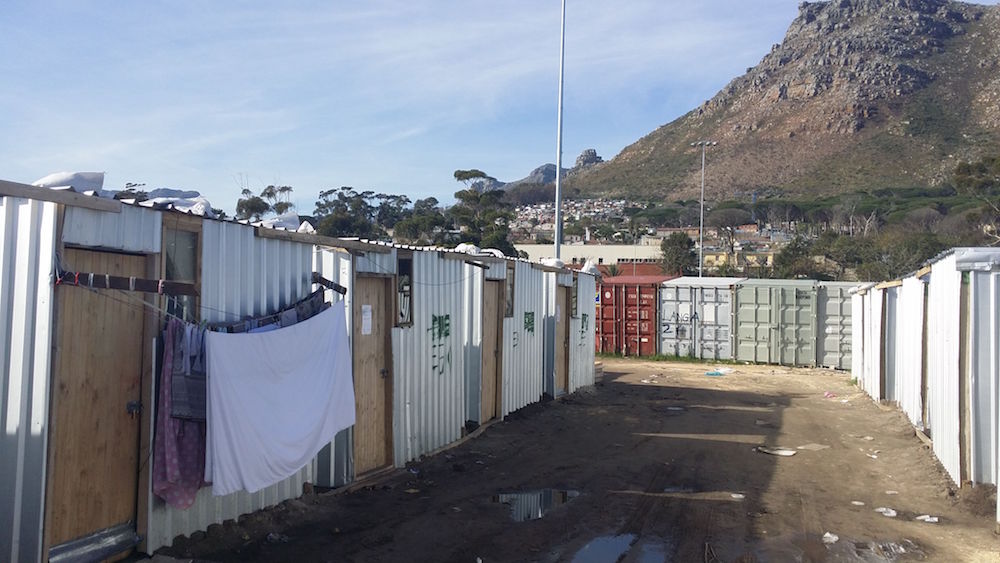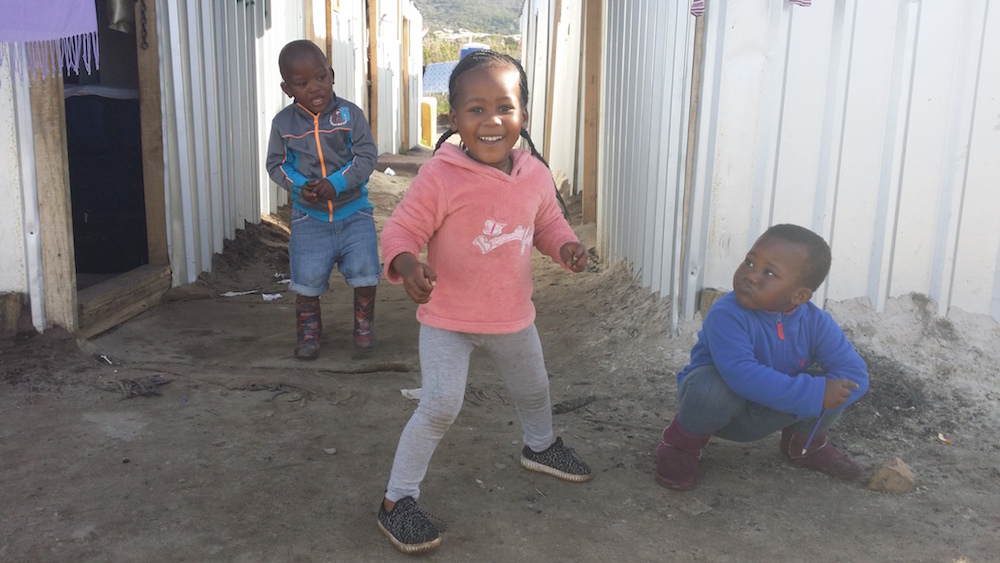All photos: Mohammed Jameel Abdulla
At least one person died after being caught in a hail of rubber bullets and tear gas when protests broke out in Imizamo Yethu, Hout Bay, this weekend. Angry residents have been protesting the squalid living conditions in the temporary accommodation set up by the City of Cape Town after fires destroyed their homes in March, as well as the lack of progress in rebuilding the settlement. When The Daily Vox visited on Tuesday, it was clear why this community’s frustrations have boiled over into civil disobedience.
There are two ways to get to Imizamo Yethu from Cape Town. The first is the scenic beach drive along Camps Bay and Llandudno, the other through the leafy suburbs and wine farms of Bishopscourt. These are some of the most expensive parts of Cape Town, known to be frequented by wealthy tourists during the holidays. The road from Bishopscourt to Imizamo Yethu, Rhodes Drive, is named after one of the chief architects of colonialism. The irony of this is not lost as you enter Hout Bay and see the scorch marks in the street where tyres were burned during the weekend’s protests.

On Tuesday afternoon, five police vans and a water cannon were stationed at the entrance to the settlement, and members of Deep Blue private security patrolled the streets. There was a greater police presence closer to the traffic circle that stands between Imizamo Yethu and the soccer field where the victims of the fire, which ravaged the community in March, were relocated to.
It was hard to miss the temporary settlement; the roads surrounding it were peppered with police vans at the time. The area brings to mind refugee camps, raising the spectre of concentration camps.

The temporary housing units provided by the City to house those who lost their homes in the fire several months ago are constructed of sheets of metal held up by wooden planks. There is a door, but no flooring and only a single window, which doesn’t open. The units are placed about 10cm apart from each other, in long rows.

Otto Sotashe, who lives in the camp, said the community could no longer accept living in these conditions.
“That’s why people are toyi-toying, because people staying here isn’t right. It’s very cold. When it rains the water gets inside the house and many of us are getting very sick,” he said.
Some of these tin homes have been entirely flooded. The temporary settlement was set up on flat land and there is no drainage system, so water stagnates until it is absorbed into the mud. In a makeshift effort to resolve this, the community has taken to digging shallow trenches between the rows to channel water away from homes.
Preschool-aged children play in the sandy pathways between the structures, coughing hoarsely, seemingly unaware of the abnormal circumstances they’ve been placed in.

There are no electrical poles or connection points in the settlement and residents say fires are prohibited for safety reasons.
Chewo Lubese, another community member, said that in the midst of the Cape’s winter, the only source of heating for people living in the settlement is small wood or coal-burning stoves.
“There’s no electricity but we have this,” Lubese said, pointing to a small portable stove. “But it’s too small to cook with and the smoke is too much. Our children have to go to the hospital a lot since we staying here.”

The tin room fills with smoke when the stove is burning. Because the housing structures only have one window, which doesn’t open, the only source of ventilation is the door. This means you have to choose between letting in the chill to get fresh air or sitting in an enclosed metal container inhaling fumes.
When the wind is strong, Mskeli Mlotya’s biggest worry is that it will collapse a shack on top of someone.
“If there’s wind, the houses come down. These houses are not strong,” he said gesturing at a structure that had recently toppled over.

Mlotya said the plot of his original house was on the mountainside where the wind was less harsh and where the rain flowed down the mountain, away from homes, instead of flooding them or pooling in pathways.
Mlotya said the City had promised residents 6×6-metre houses within three months, but it was now going into the fourth month since they’d been living in the resettlement area.
“People are upset because people have been dying here and getting sick,” he said.
According to Mlotya, many members of the community have refused to remain in the temporary settlement any longer, and have tried to move back to their previous home on the mountainside. This, he said, had led to conflict with the City which wanted to remove all structures on the Imizamo Yethu area in order to prepare the site for more safe and permanent housing for the community.
“There are also other people there who would want to come down but won’t because they say these houses [at the temporary settlement] are too small and they have a lot of family,” he said.
What made the situation worse, he said, was that the city refused for a long time to even address the community. It was not until the violent protests over the weekend that the City addressed the Imizamo Yethu community on Monday.
Andrew Christoffel Nissen, provincial commissioner of the South African Human Rights Commission told the Daily Vox that he’d been regularly visiting the settlement.
“Walking through the area, it’s unacceptable for anyone to be living in these conditions. It’s very sad and unjustifiable, but we are monitoring the city in what they’re doing to ensure that they fast-track the building of permanent residences for these people,” he said.
Nissen said City of Cape Town mayor Patricia de Lille had addressed the community on Monday. She did so from outside the Hout Bay police station via loudhailer, and quickly departed after receiving reports from police that she may be in danger.
De Lille was not available for comment but in a press statement released earlier this week said, “I am prioritising this matter and I am personally leading this and unblocking any issues [in relation to the speedy building of permanent residences for the community]”.
On Tuesday afternoon, news filtered through the community that one of their own, Songezo Ndude, had passed away after being injured during the protest on Monday. The community gathered on the soccer field and joined in a mourning song.
A member of the Ndude family said the mourning was still fresh, the pain still strong, but that it would empower the community to fight on.
“He died fighting for the people, that struggle will not end. The community has shown a lot of support to the family. His death was not in vain,” they said. – The Daily Vox